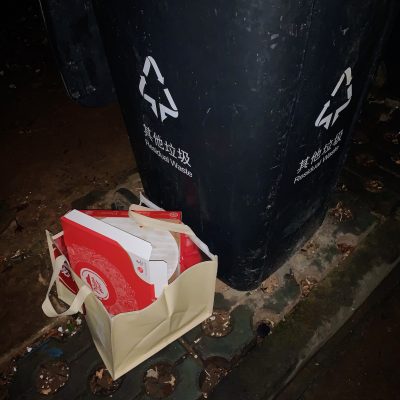
The importance of waste sorting
“I really hope that waste sorting will become widespread and implemented throughout the country.”
These words were the only thoughts that went through my head last year after my pet ate a plastic bag and I helped him to induce vomiting.
As the economy grows and people’s lives get better, waste sorting is becoming a serious issue. I have thought about the main reason is that people don’t have the awareness of waste sorting and the relevant policies are incomprehensive and not implemented. We don’t know how to classify our waste, such as which bin to put the leftover in disposable tableware or unfinished pearl milk tea into.

Takeaway on the side of the bin created by Anqi.
For example, in the low-rise residential area where I live, each building has 6 floors and 12 households, but there is only one bin for every 6 buildings. This is not just in our neighbourhood, it’s normal to see in life. In many public places, there are only one or two bins for all the garbage, and it’s often overflowing.
Of course, we’ve all heard the policies of waste sorting, but we don’t know exactly what it’s for. Let’s think of a scenario where a person walks up to colourful bins with his day’s waste and doesn’t know which colour is right. The next step is to just pick a bin and throw it in.
So the question arises, why not learn at first and classify the waste at home before throwing it away?
The answer is simple – there is detailed information on the internet about how to sort, but as it is not compulsory, no one is going to ‘waste time’ learning it all. Also, the number of coloured bins has not increased and even if people know how to sort daily waste, they still have to put it in the only bin.
And, because everyone is used to it, used to the strong rotting smell of garbage in the summer, used to the sticky feeling of food rotting and unclosed beverages on the ground, and used to the small amount of rubbish next to the full bin, also used to this environment without changing.

Plastic paper on the ground created by Anqi.
One day, my friend and I planned to meet for brunch, but it was almost the appointed time and she hadn’t arrived. I called her and asked her where she was.
She picked up the phone and said angrily, “My shoes and trousers all got spilled with leftovers. I’m in the toilet wiping my shoes! I’ll be there in five minutes!” Then she quickly hung up the phone.
I was confused and dumbfounded as to why the leftover had been spilled on her. I realised when she came rushing in, sat down and angrily told me about what she had just experienced.
A bin was overflowed that garbage came out of the top, however, a man continued to pile unfinished takeaway on top.
Although the lid was on, the takeaway box rolled off as it was stacked at a height that didn’t belong in the bin, spilling food residue all over the ground. But the person who threw the garbage was gone.
She was furious and kept complaining about why the bin was so full and he still piled on top. Why didn’t dispose of the leftover before throwing it away? Why is there only one bin and no cleaning staff to deal with it even when it is overflow?
At this time, I wondered why there was no bin set specially for food waste, but on second thought, it’s true that we rarely see waste sorting bins.
After saying goodbye to her over brunch, I forgot about it – after all, it’s all very common.

My pet Oreo created by Anqi.
I once saw my dog Oreo playing with a plastic bottle on the lawn. I didn’t take it seriously at all, because many people would throw plastic bottles as frisbees for their puppies to play with. It wasn’t until one day when he was chewing on a plastic bag and heard him coughing that I realised he had eaten half of the bag and was going to spit it out. I have tried to help him, but that didn’t work. So, I took him to the pet hospital to induce vomiting in a hurry.
After Oreo vomited it out, the vet told me that Oreo had played with the plastic bag and accidentally ingested it because it had food residue in it.
When I heard from the vet, I was angry about why used plastic bag was on the ground. The plastic bag could have been blown away from the bin, or it could have been thrown away carelessly. But in either case, it shouldn’t be on the ground.
I wouldn’t have pondered this issue if I hadn’t been scared by Oreo. So, it makes me think that our habituation and carelessness can have serious consequences.
Also, it impacts the environment adversely because unsorted waste cannot be properly recycled, which leads to wasted resources, encroachment on land and environmental pollution. In the end, all this will affect human beings, each of us, because of humans as products of their environment, but also as creators of themselves and transformers of their environment.
After having gone through all this thinking, I will pay attention to garbage sorting, classify daily waste before throwing it in the correct bin (if there are coloured bins), and also help to promote waste management so that more people can understand and engage with, as well as promoting sustainable development.
